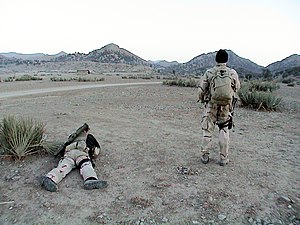
Back استطلاع خاص Arabic Fernspäher German Reconocimiento especial Spanish סיור מיוחד HE Ricognizione speciale Italian 특수 수색정찰 Korean Reconhecimento especial Portuguese Special reconnaissance SIMPLE การลาดตระเวนพิเศษ Thai Özel keşif Turkish

Special reconnaissance (SR) is conducted by small units, such as a recon team, made up of highly trained military personnel, usually from special forces units and/or military intelligence organizations. Special reconnaissance teams operate behind enemy lines, avoiding direct combat and detection by the enemy. As a role, SR is distinct from commando operations, but both are often carried out by the same units. The SR role frequently includes covert direction of airstrikes and indirect fire, in areas deep behind enemy lines, placement of remotely monitored sensors, and preparations for other special forces. Like other special forces, SR units may also carry out direct action and unconventional warfare, including guerrilla operations.
In intelligence terms, SR is a human intelligence (HUMINT) collection discipline. Its operational control is likely to be inside a compartmented cell of the HUMINT, or possibly the operations, staff functions. Since such personnel are trained for intelligence collection as well as other missions, they will usually maintain clandestine communications to the HUMINT organization and will be systematically prepared for debriefing. They operate significantly farther forward than even the most forward friendly scouting and surveillance units.[citation needed]
In international law, SR is not regarded as espionage if combatants are in proper uniforms, regardless of formation, according to the Hague Convention of 1907,[1] or the Fourth Geneva Convention of 1949.[2] However, some countries do not honor these legal protections, as was the case with the Nazi "Commando Order" of World War II, which was held to be illegal at the Nuremberg Trials.
- ^ "Convention (IV) respecting the Laws and Customs of War on Land and its annex: Regulations concerning the Laws and Customs of War on Land, Article 29". International Red Cross. 18 October 1907. Retrieved 11 November 2007.
- ^ "Fourth Geneva Convention relative to the Protection of Civilian Persons in Time of War. Geneva, 12 August 1949, Article 29". International Red Cross. Retrieved 11 November 2007.
© MMXXIII Rich X Search. We shall prevail. All rights reserved. Rich X Search